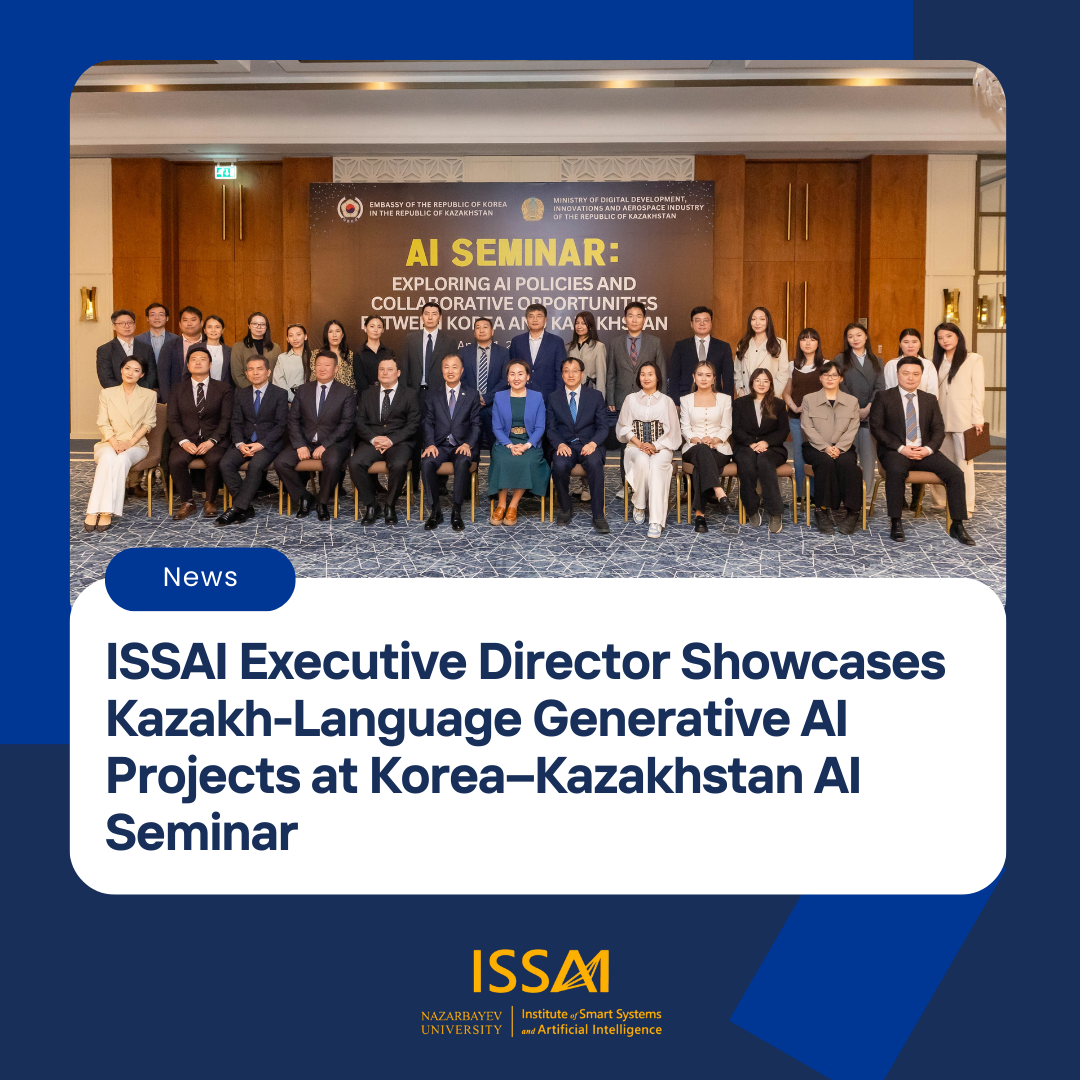Yerbol Absalyamov, Executive Director of the Institute of Smart Systems and Artificial Intelligence (ISSAI) at Nazarbayev University, participated as a featured speaker at the seminar “Exploring AI Policies and Collaborative Opportunities between Korea and Kazakhstan.” The event, hosted at the Sheraton Astana Hotel, was jointly organized by the Embassy of the Republic of Korea in the Republic of Kazakhstan and the Ministry of Digital Development, Innovation and Aerospace Industry of Kazakhstan.
The seminar served as a high-level platform for public diplomacy and international collaboration, gathering leading experts, government officials, and business representatives to explore strategies and policy frameworks shaping the future of Artificial Intelligence (AI) in both countries.
During the second session focused on practical cooperation, Yerbol Absalyamov presented a talk titled “Past (KAZ-LLM), Present (Oylan Language Vision Model) and Future (Multimodal Sparse Language Model) of Generative AI at ISSAI for Kazakh Language.” In his remarks, he introduced ISSAI’s AI roadmap, showcased live demos of its public-facing tools SoyleApp and Oylan, and emphasized the importance of developing AI technologies tailored to the Kazakh language and culture. He also underlined the center’s commitment to open-source development, which enables broader academic and industry use.
The session moderator, Minho Lee, Assistant Professor of Computer Science at Nazarbayev University, expressed appreciation for ISSAI’s work and praised the accessibility of its tools, highlighting their impact on student-led projects and local AI capacity-building.
During the Q&A session, in response to a question from the Ambassador of the Republic of Korea in the Republic of Kazakhstan, Dr. Cho Tae-ick regarding the possibility of adding the Korean language to the SoyleApp, Yerbol Absalyamov stated: “We are ready to add any language to SoyleApp if the interested party can provide the necessary dataset and experts who will verify the accuracy of the translations.” His response highlighted ISSAI’s collaborative and inclusive approach to language technology development. Audience also asked questions about GPUs issues in Kazakhstan and particularly in ISSAI, the process of developing KazLLM, what kind of methods have been implemented in KazLLM to prevent the issues of misuse, hallucination, and bias in generative AI, and also about upcoming plans to further expand Kazakh language datasets in the near future.
The seminar featured a range of insightful presentations from Korean and Kazakh experts. Dmitriy Mun, Vice Minister of Digital Development, Innovation and Aerospace Industry of Kazakhstan, opened the event by discussing the launch of Kazakhstan’s National Artificial Intelligence Platform and the development of the Alem.AI Center in Astana.
From the Korean side, Sungwon Ahn, Director at the Software Policy & Research Institute (SPRI), presented strategies for Korea’s AI policy development, emphasizing a shift “beyond infrastructure to AI in everyday life.”
Hamid Reza Shahbazkia, Professor at KIMEP University, gave a regional perspective with his talk on “Central Asia and AI-Independence,” discussing data sovereignty and regional AI ecosystems.
Minnseok Choi, Assistant Director at Korea’s Electronics and Telecommunications Research Institute (ETRI), presented Korea’s efforts in AI safety and the formation of international safety frameworks.
Later in the program, Changhee Yun from Korea’s National Information Society Agency (NIA) discussed government-wide adoption of generative AI, identifying both opportunities and challenges in policy and implementation.
Other notable speakers included Ilyas Makashev, Advisor at Astana Hub, who spoke on the local innovation ecosystem; Dana Abdrasheva, Vice-Rector of Korkyt Ata Kyzylorda University, who shared insights on academic cooperation in AI; and Seunghun Hong from the Korea Institute of Public Administration (KIPA), who outlined regulatory developments in Korea’s public and private sectors.
The seminar concluded with a lively panel discussion and further Q&A, where participants exchanged views on the ethical, regulatory, and practical aspects of AI, with active engagement from ISSAI and other key institutions.
With over 200 participants from top universities, research institutions, and tech hubs in Astana, the event underscored the strong mutual interest in AI innovation and set the stage for deeper Kazakhstan–Korea cooperation in digital technology.



